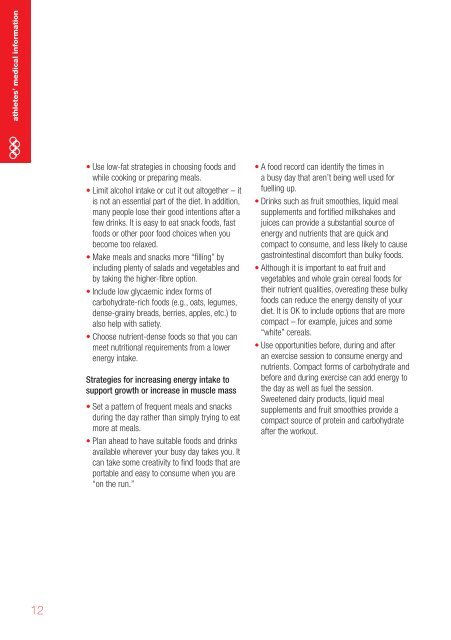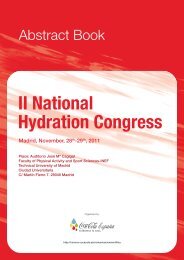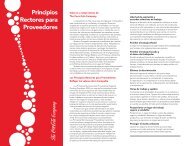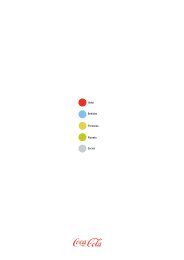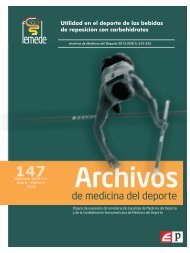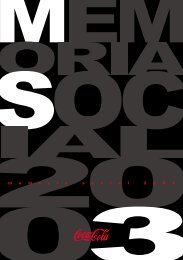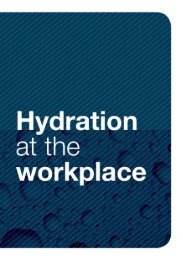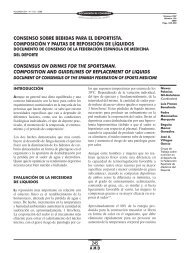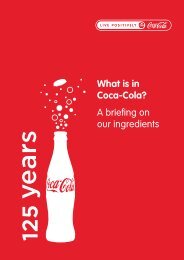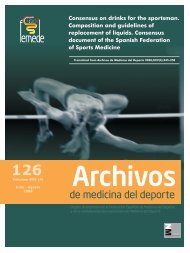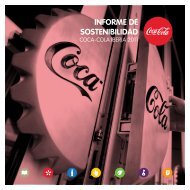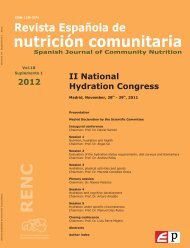Nutrition for Athletes - Coca-Cola
Nutrition for Athletes - Coca-Cola
Nutrition for Athletes - Coca-Cola
Create successful ePaper yourself
Turn your PDF publications into a flip-book with our unique Google optimized e-Paper software.
athletes’ medical in<strong>for</strong>mation<br />
• Use low-fat strategies in choosing foods and<br />
while cooking or preparing meals.<br />
• Limit alcohol intake or cut it out altogether – it<br />
is not an essential part of the diet. In addition,<br />
many people lose their good intentions after a<br />
few drinks. It is easy to eat snack foods, fast<br />
foods or other poor food choices when you<br />
become too relaxed.<br />
• Make meals and snacks more “filling” by<br />
including plenty of salads and vegetables and<br />
by taking the higher-fibre option.<br />
• Include low glycaemic index <strong>for</strong>ms of<br />
carbohydrate-rich foods (e.g., oats, legumes,<br />
dense-grainy breads, berries, apples, etc.) to<br />
also help with satiety.<br />
• Choose nutrient-dense foods so that you can<br />
meet nutritional requirements from a lower<br />
energy intake.<br />
Strategies <strong>for</strong> increasing energy intake to<br />
support growth or increase in muscle mass<br />
• Set a pattern of frequent meals and snacks<br />
during the day rather than simply trying to eat<br />
more at meals.<br />
• Plan ahead to have suitable foods and drinks<br />
available wherever your busy day takes you. It<br />
can take some creativity to find foods that are<br />
portable and easy to consume when you are<br />
“on the run.”<br />
• A food record can identify the times in<br />
a busy day that aren’t being well used <strong>for</strong><br />
fuelling up.<br />
• Drinks such as fruit smoothies, liquid meal<br />
supplements and <strong>for</strong>tified milkshakes and<br />
juices can provide a substantial source of<br />
energy and nutrients that are quick and<br />
compact to consume, and less likely to cause<br />
gastrointestinal discom<strong>for</strong>t than bulky foods.<br />
• Although it is important to eat fruit and<br />
vegetables and whole grain cereal foods <strong>for</strong><br />
their nutrient qualities, overeating these bulky<br />
foods can reduce the energy density of your<br />
diet. It is OK to include options that are more<br />
compact – <strong>for</strong> example, juices and some<br />
“white” cereals.<br />
• Use opportunities be<strong>for</strong>e, during and after<br />
an exercise session to consume energy and<br />
nutrients. Compact <strong>for</strong>ms of carbohydrate and<br />
be<strong>for</strong>e and during exercise can add energy to<br />
the day as well as fuel the session.<br />
Sweetened dairy products, liquid meal<br />
supplements and fruit smoothies provide a<br />
compact source of protein and carbohydrate<br />
after the workout.<br />
12


